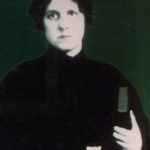The First Female Ordained Rabbi: Regina Jonas
By Jackie Brettschneider, Research Intern, Center for Jewish History
As early as high school, Regina Jonas talked about becoming a rabbi. At the time not one woman was ordained to the position. Jonas’s pursuit came with many hardships and obstacles because she was a woman. Jonas, however, pursued ordination whole-heartedly because of her dedication to Jewish history, the Torah and the Hebrew language. Jonas was finally ordained as the first ever female rabbi in 1936 by Rabbi Max Deinemann. Not only is she an inspiration to all Jewish women she is an inspiration to women wanting to be represented in a patriarchal society.
Regina Jonas was born on August 3, 1902 in Berlin to her parents Wolf and Sara Jonas. The town she grew up in, Scheunenviertel, was a poor Jewish neighborhood. Her father was a merchant and was probably Regina’s first teacher. Sadly tuberculosis took his life in 1913.
Orthodox Rabbi Max Weyl supported Jonas in her efforts to become ordained. Although it was unusual at the time, Rabbi Weyl had quite liberal ideas including religious education for girls. He would meet with Jonas once a week to study the Talmud, Shulhan Arukh and other rabbinic literature. Lucky for Jonas she was helped by liberal rabbis who supported her endeavors.
Jonas went on to pass her Abitur, a sort of final exam taken by students in Germany, in 1923 and attended a teacher’s seminar giving her the education to teach the Jewish religion to girls in Berlin.
At the time, the highest degree a woman could aspire to was an academic teacher’s degree. Jonas was different; she was the only woman at the college she attended, Hoachshule für die Wissenscaft des Judentums, who dreamed of becoming a Rabbi. This dream at the time was unfathomable to most people, but not to Jonas.
The professor of Talmud and person responsible for rabbinic ordination, Eduard Baneth, was the supervisor of Jonas’s final thesis, “May a woman hold rabbinic office?” Jonas wrote about halakhic, or Jewish law, and achieving gender equality, writing that a female rabbi would be understood as a continuation of tradition. She strayed from both orthodox and reform beliefs, stating that she didn’t want to drop halakhic but wanted to find gender equality within it. On the first page of her thesis she wrote, “I personally love this profession and, if ever possible, I also want to practice it” and on the last page she wrote, “Almost nothing halakhically but prejudice and lack of familiarity stand against women holding rabbinic office.” Prejudice and inequality within the Jewish religion and community were the only things standing between Jonas and her dream of becoming a rabbi.
Jonas believed that female rabbis are “a cultural necessity.” According to Jonas, specific female attributes such as compassion and psychological intuition make women a necessity in both the Jewish community and leading it in prayer.
These new and progressive ideas in her thesis received a grade of only “good.” Her supervisor died shortly after and his successor refused to ordain females. This would be the beginning of a rough patch Jonas would face during her college career. All the other professors at the school refused to speak on her behalf or about the situation. They feared for their reputations and what it meant to help a woman seeking a leadership role in the community. Without the help of her professors and school supervisors she wasn’t ordained and instead graduated as a religious teacher.
Jonas went on to teach at girls’ schools in Berlin while still dedicated to becoming an ordained rabbi. After much work and dedication Rabbi Max Dienemann, Executive Director of the Conference of Liberal Rabbis, finally ordained her in 1935. She served as rabbi at an old age home.
At the time of her ordination, however, the Nazis were beginning to gain power in Germany. In 1941, the Nazis closed all temples. Jonas still held special services for the Jews forced to work. Her services were said to have been uplifting for the people who attended them during this very hard time. In 1942, however, Jonas and her mother were deported to Theresienstadt concentration camp. Jonas still didn’t abandon her duty and continued to work as a rabbi there. Sadly, on October 12, 1944 she and her mother were deported to Auschwitz and, it is believed that she was killed that same day.
Jonas went through many hardships and obstacles to become a rabbi and once she did she didn’t allow anything to stop her from performing her duties. According to Women and Judaism, by Roslyn Lacks, she was a “militant feminist par excellence, born ahead of her time.” She’s an inspiration to women whose dreams include positions of leadership usually held exclusively by men. She displayed how hard work and dedication can break through the barriers that exist because of sexism and any prejudice in the way of achieving ones desires.
For more on Regina Jonas see:
The Jewish Women’s Archive
The archives at the Center for Jewish History: “Regina Jonas Clippings Collection 1938-2000” Held by the Leo Baeck Institute Catalog Record
“The Discovery of Fraülein Rabbiner Regina Jonas: Making Sense of our Inheritance,” Elizabeth Sarah, European Judaism: A Journal for the New Europe Vol. 28, No. 2 (Autumn ‘95), pp. 91-98
“My Year with Regina Jonas,” Toby Axelrod, Bridges Vol. 14, No. 2, The Bridge of Translation (Autumn, 2009), pp. 27-31
Image above from https://commons.wikimedia.org/wiki/File%3AReginaJonas1.jpg


